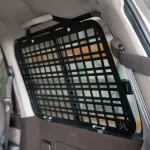
A LEGISLATED ban of all off-road vehicles from Gulf St Vincent beaches has been recommended by a State Government report into the plight of shorebirds.
The report, commissioned by the Adelaide and Mt Lofty Ranges Natural Resources Management Board, found a serious decline in many species, blamed in part on disturbances caused by four-wheel-drive and other off-road vehicles.
Co-author of the report, titled Shorebird Population Monitoring in Gulf St Vincent, Chris Purnell, said beach damage caused by off-road vehicles was more of a problem in SA than other states.
He said the use of four-wheel-drives on beaches had the combined problem of ground nests being destroyed, compaction of sediments which destroyed breeding in bird food species such as worms, and preventing migrating birds from resting and feeding for their journey home.
“Habitat is being ruined, an the main problem is constant disturbance from noisy vehicles which prevents the birds conserving energy so that they can fly 10,000km at a time,” he said.
“The disturbance is almost the same as a total habitat loss for these birds.
“They are on constant lookout and not feeding and they are not resting and not increasing their energy levels.”
The shores of Gulf St Vincent are considered significant as a resting place for migratory birds, which fly from as far away as Siberia during the northern winter, and Mr Purnell said a separate study was attempting to secure international protection for them.
The shorebirds on Gulf St Vincent beaches and wetlands include sandpipers, plovers, stints, oystercatchers, godwits, curlews, knots and greenshanks.
Mr Purnell said the worst affected sites were at Thompsons Beach, Port Gawler, Light Beach, Port Prime and Mallala.
Chairman of the Natural Resources Advisory Unit of Four Wheel Drive South Australia Don Ransom, said any blanket ban plucked “out of the air” would be opposed by the four-wheel-drive community.
“This idea is becoming more formalised than other ideas and we expect there will be a consultation process that we will have input to,” he said.
“These people would want to ban people on the beaches if they could get their way.
“There would have to be some pretty good reasons; you can’t just pluck something like this out of the air.”
Environment Minister Ian Hunter would not rule out a ban but said councils had the power to do so in their own areas.
Most of the state’s beaches are under the care, control, and management of local councils,” he said.
“The department and natural resource management boards will continue to work with councils to manage vehicles and minimise impacts on the coast.”
The shorebird study, released this week, involved the counting of individual birds and species of birds at dozens of locations, and comparing this top historical counts. At some of the worst affected areas, bird numbers had fallen fell by more than half.




